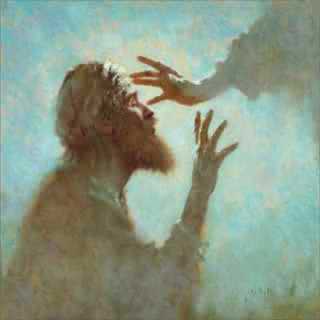October 28, 2012
Mark 10: 46-52
If we are going to be healthy and holy, we must be willing to grow. But growing is not easy. Growing involves change. We find ourselves with new experiences and in new circumstances. Even though many of those new opportunities may contain a real “good,” growing often also entails leaving other “goods” behind.
This truth is illustrated in today’s gospel, the story of Bartimaeus. When Jesus asks Bartimaeus, “What is it that you want me to do for you?” Bartimaeus answers, “Master, I want to see.” Now we imagine that the request by Bartimaeus was an easy request to make. After all, who does not want to see? But this story from the gospel cleverly suggests to us that Bartimaeus’ request was really much more complicated. The story tells us that Jesus met Bartimaeus as he was leaving Jericho. Now the thing you need to know about Jericho is that Jericho was the last stop on the road to Jerusalem. That meant that all the pilgrims that were going up to the temple for the great Jewish feasts had to pass through Jericho. The city itself was filled with commotion as pilgrims bought provisions and found lodging for the night. But every one of those pilgrims would in time have to leave the city and go through the single gate that opened on the road to Jerusalem. It is right there outside that gate, that Bartimaeus sat. From the perspective of begging, Bartimaeus held prime real estate! All the pilgrims going up to Jerusalem would have to walk past him as he cried out for alms. It would be a difficult for them to refuse this blind beggar and then in good conscience go up and worship God in the temple. So Bartimaeus had a successful business in a good location. He probably made a good deal of money for himself and for his family. In this operation, his blindness was a real advantage because it increased the sympathy of those who passed by and also increased his income.
If, however, Bartimaeus was suddenly able to see, he would have to find a new job. He might not be able to maintain his standard of living. So when he answers Jesus, “Master, I want to see,” he is taking a risk. He is aware he is about to leave the comfort and success of his former life and embrace the new possibilities that Jesus is offering him.
Now all of us have our own lives with our own blessings. Our lives might not be perfect, but they are ours. But at any time Christ can invite us to grow, to change. As attractive as that invitation might be, often we also have to leave some good things behind. This can happen in the normal course of life: we leave our home to go to college; we leave one job for a new one. But this invitation to grow can also happen when what is normal changes. When a member of our family undergoes divorce, all the relationships in our family structure need to be realigned. When an aging parent requires more of our time and presence, our schedule must change. When our health deteriorates, we can no longer do the things that we once took for granted. In each one of these situations, Christ can be asking us to grow. We must decide whether we are going to hold on to the “goods” that are no longer available to us or whether we can embrace the new “goods” that Christ is offering.
Bartimaeus chose the new thing. He understood that the security and success of his former life would no longer be his. He also realized that if he followed Christ he would be able to see the world in a way he never did before, with eyes that were healed of their blindness. Above all, Bartimaeus trusted the man who healed him. He believed that if Jesus was the one who was asking him to change, it would be for the good.
You and I need to share in that faith of Bartimaeus. When Christ invites us to grow, we need to trust him. When a change comes in our life which Christ asks us to accept, we need to believe that it will not destroy us but will open our eyes to a new way of living.

